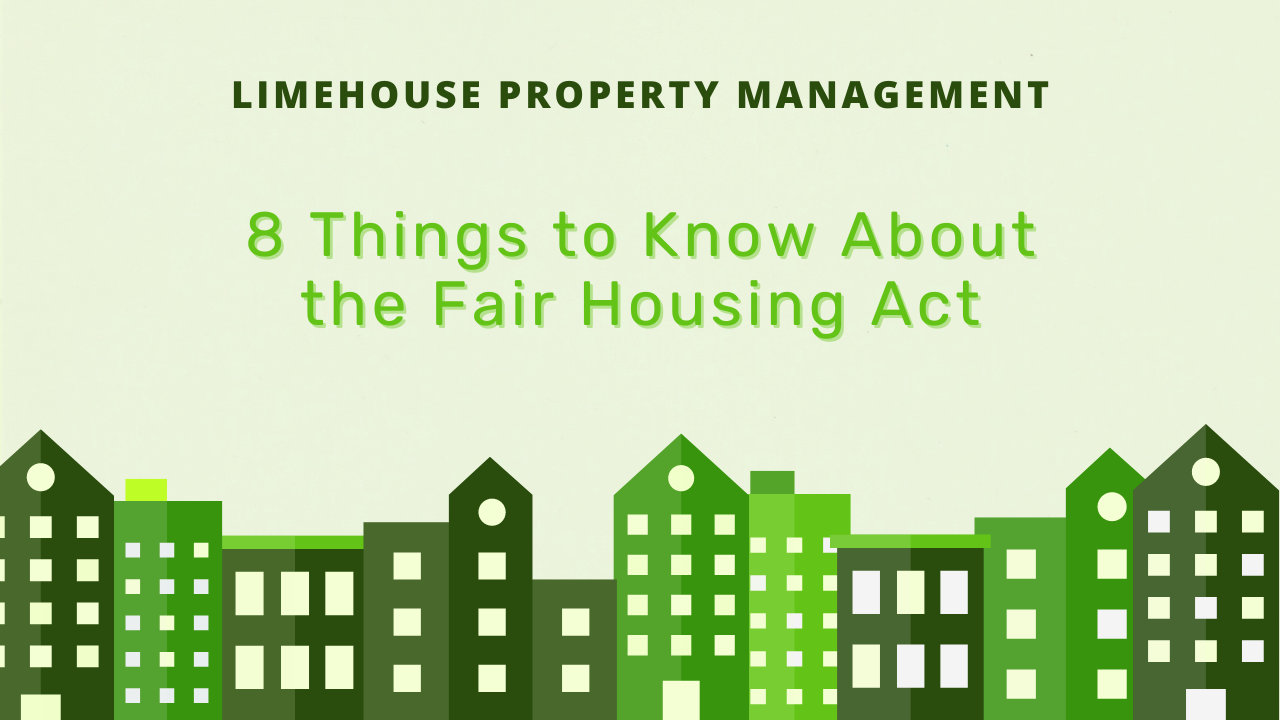8 Things to Know About the Fair Housing Act

The Fair Housing Act (FHA) is one of the most significant federal laws affecting rental property owners in the United States. Designed to protect tenants from discrimination, the act ensures equal access to housing opportunities.
As a rental property owner, understanding and adhering to this law is not only a legal requirement but also crucial for maintaining a positive reputation and reducing risks.
Here are eight things you need to know:
1. What Is the Fair Housing Act?
The Fair Housing Act, which was passed as a component of the Civil Rights Act of 1968, outlaws discrimination in housing on the grounds of race, color, national origin, religion, sex, family status, and disability.
This law affects everyone in the housing community, making it illegal for landlords or property managers to refuse housing or provide different terms and conditions based on any of these protected categories.
The law is enforced by the Department of Housing and Urban Development (HUD) and applies to most residential property owners. Familiarizing yourself with this law is essential to avoid unintentional violations, hefty fines, or legal battles.
2. Protected Classes Under the Fair Housing Act
Between the federal and state fair housing laws, these are the protected classes:

- Race
- Color
- Religion
- National Origin
- Sex
- Disability
- Elderliness
- Funding Source
- Familial Status
- Sexual Orientation
- Gender Identity
- Military Status
As a landlord, it’s crucial to treat all prospective tenants equally. Discriminating against someone for these reasons could lead to legal consequences and damage your reputation as a property owner.
3. Discriminatory Practices to Avoid
Even if your intentions are good, certain actions can still be deemed discriminatory under the FHA. Here are a few practices you should avoid:
- Refusing to rent based on a protected class: Discriminating against someone for the reasons above could lead to legal consequences and damage your reputation as a property owner.
- Providing different terms and conditions: Offering different rental terms, higher security deposits, or altering rental agreements based on a tenant’s protected status is prohibited.
- Imposing stricter rules: For example, setting stricter noise rules for families with children could be seen as discriminatory.
- Advertising discriminatory preferences: Even in your property ads, you cannot specify a preference for or against renters based on protected characteristics.
As a landlord, keeping these practices in mind when screening tenants and managing properties can protect you from accusations of discrimination.
4. Reasonable Accommodations for Tenants with Disabilities
Landlords are required by the FHA to provide renters with disabilities with reasonable accommodations. This means allowing modifications to the unit (such as installing grab bars in the bathroom) and making adjustments to policies (like assigning a closer parking space) to accommodate the tenant’s needs.

It’s important to note that while you may be required to allow these modifications, tenants typically must bear the cost of alterations unless the property receives federal funding.
5. Exemptions to the Fair Housing Act
While the Fair Housing Act applies broadly, there are certain exemptions:
- Owner-occupied buildings with four or fewer units (the “Mrs. Murphy Exemption”): If you reside in one of the units of a rental property with four or fewer units, you’re exempt from the FHA.
- Single-family homes rented without a broker: If you own three or fewer single-family homes and rent them without using a broker or real estate agent, you may be exempt from the FHA.
- Religious organizations and private clubs: These groups can restrict rentals to their members, provided they don’t discriminate based on other protected classes.
It’s essential to note that while these exemptions exist under federal law, state and local fair housing laws might have stricter requirements, so always check local regulations.
6. What Happens if You Violate the FHA?
Fair Housing Act violations can lead to serious consequences, including:
- Fines: HUD can impose fines for first-time violations, the amount of which depends on the severity of the case.
- Lawsuits: Tenants can file civil suits, which could result in significant financial settlements.

- Damaged reputation: A single discrimination case can tarnish your reputation as a landlord, making it harder to find good tenants in the future.
To avoid these risks, ensure that your screening and management processes align with FHA regulations.
7. Fair Housing Act and Advertising
When marketing your rental property, your advertising must comply with the FHA. This means avoiding language that discriminates or shows preference based on any of the protected classes.
Phrases like “no kids” or “ideal for single professionals” could be seen as discriminatory. The key is to focus on the property’s features and benefits, not on the type of tenant you prefer.
8. The Role of Professional Property Managers in FHA Compliance
Keeping track of the Fair Housing Act can be challenging, especially for new or small-scale property owners.
A single misstep can lead to fines, lawsuits, and reputational harm. This is why many landlords choose to work with a professional property manager.
Why Hire a Professional Property Manager?
Professional property managers are well-versed in local, state, and federal housing laws, including the Fair Housing Act. They can handle tenant screening, lease agreements, property maintenance, and tenant interactions in a way that ensures full compliance with the FHA.
Here’s how they can help:
- Legal Expertise: Property managers are trained to understand and comply with laws that affect rental properties. They know the ins and outs of the Fair Housing Act and can apply this knowledge to all aspects of property management.

- Fair Tenant Screening: A professional manager can set up consistent and non-discriminatory tenant screening procedures. This includes using neutral criteria like income verification, credit history, and references—without factoring in any of the protected classes.
- Handling Requests for Reasonable Accommodations: Dealing with tenant requests for modifications or accommodations can be tricky. A property manager will know what constitutes a reasonable accommodation and how to handle these requests efficiently and lawfully.
- Protecting Your Reputation: Property managers reduce the risk of legal disputes, complaints, or bad reviews. They ensure every tenant is treated fairly, which helps maintain a positive image for your rental business.
- Marketing Compliance: A property manager will ensure that all rental listings and advertisements comply with FHA guidelines, so you can avoid potential pitfalls that arise from discriminatory language.
Conclusion
As a rental property owner, understanding the Fair Housing Act is crucial to staying compliant and avoiding legal trouble. By following best practices and working with a professional property manager, you can protect yourself from violations and provide fair housing opportunities to all tenants.
Managing your property responsibly and in accordance with the law will enhance your reputation, attract quality tenants, and help your rental business thrive. If you need assistance, hire the professional services of Limehouse Property Management.
Disclaimer: Please note that the information provided in this blog is intended for general guidance and should not be considered as a replacement for professional legal advice. It is important to be aware that laws pertaining to property management may change, rendering this information outdated by the time you read it.
